
You should take your branding very seriously if you want to boost your sales, and by this, I mean both your personal and business branding, as these two components have become inseparable.
77% of B2B marketing leaders say that branding is of critical importance when it comes to growth. So, in other words, if you want to grow your business, you first need to develop a strong brand – people are more likely to opt for your product or service if you’re an established industry leader and if they have already heard about your brand.
Moreover, they will pick your brand over a more affordable, no-name company.
So, it’s essential to stay on your target audience’s radar and promote yourself and your brand as much as possible.
Together with providing quality and making sure that you always deliver on your promises, this is the best way to maximize your branding value and equity.
I know that it’s easier said than done, which is why I’ve rounded up a couple of stories that discuss the importance of branding and explain how to succeed in it from my recent B2B Sales Handbook.
All these stories are drawn from my own and the experience of my co-workers, which means that they’re authentic and that you can easily implement them.
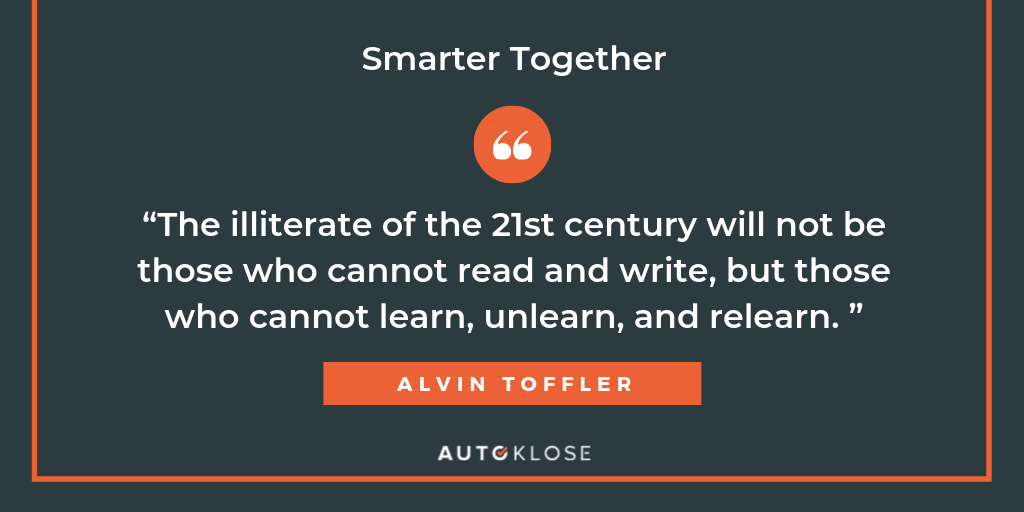
Smarter Together
“The illiterate of the 21st century will not be those who cannot read and write, but those who cannot learn, unlearn, and relearn. ”
― Alvin Toffler
Sales is the lifeblood of every business. But it’s hard to get it right when buyers are more and more in control, with hundreds if not thousands of options to choose from.
There are at a minimum two fundamental ways we witness sales leaders successfully cope with this trend:
- They are quick to learn, unlearn, relearn, and implement the most innovative solutions.
- They join forces with Marketing. True sales leaders understand how important it is to build this sacred revenue unity.
Let’s unwrap these two methods and see how you can make the most of them.
Some founders, entrepreneurs, and business professionals are more skilled at sales, while some aren’t exactly well-versed when it comes to this. But the keyword here is “skill.”
Sales is a skill.
Much like writing code or building a financial model is a skill.
That means that sales can be learned and practiced. Therefore building that muscle, applying what has been learned, asking for feedback, and teaching is part of shaping sales as a skill.
The true masters (Yodas) of sales are people passionate about this profession, who understand its true meaning.

Why are you in sales?
It is essential to ask yourself this question, and even more so, it’s vital to stay true to yourself.
The true masters of this profession answer this question in an almost altruistic way – because Sales is all about helping. To sell is to help someone in need by providing the best solution to their problem or improve their current status.
With that comes a reward.
Now, because we are living in such great times, surrounded by abundance, it has never been more critical that Sales and Marketing collaborate.
Chief Revenue Officers (CROs) and Chief Marketing Officers (CMOs) have to work together and own the revenue strategy. They can not afford to have a wall between themselves.
A good analogy would be that of good parents who raise their kids with a joint set of values and goals to ensure a prosperous future.
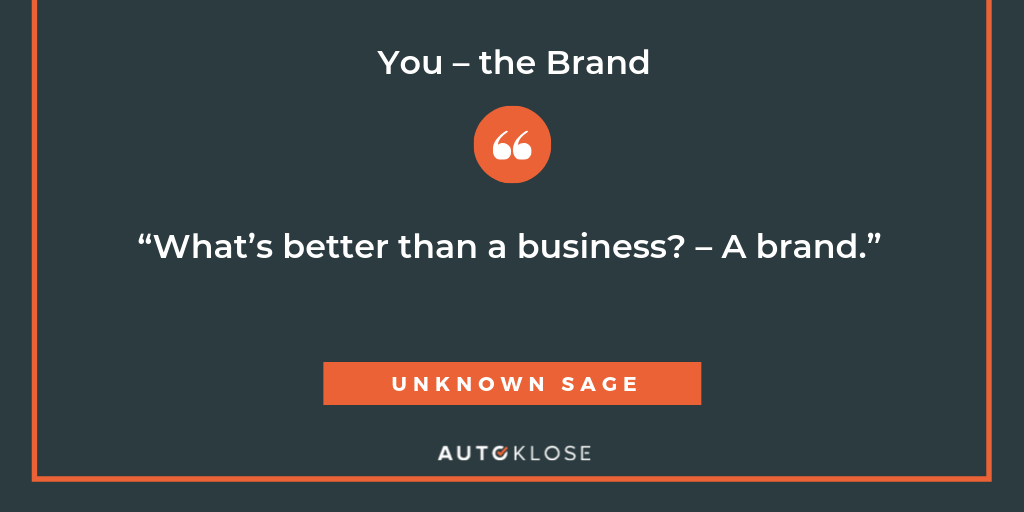
You – the Brand
“What’s better than a business? – A brand.”
— Unknown sage
When we think of a brand, trust is the first quality that comes to mind.
Trust is the most important currency one can have on an imaginary, but ubiquitous, relationship bank account.
In order to build trust, one has to communicate with integrity, honesty, bravery, and care.
The more we communicate, the trust grows stronger. As trust grows we want to engage and communicate more. The fear of engaging or making a transaction almost disappears.
This is true of both people and organizations.
It has never been easier to communicate. In fact, it is so easy that we from information overload.
How can one build a brand and personal connections at scale, out there in the wilderness of online media and offline events?
Take action.
Give yourself permission to “speak up”, engage, and write or record what’s on your mind. Be more you.
As Zig Ziglar famously noted, “You don’t have to be great to start, but you have to start to be great.”
Remember, in order to build trust, the first step is to communicate. But to build trust one has to communicate with integrity, honesty, bravery, and care.
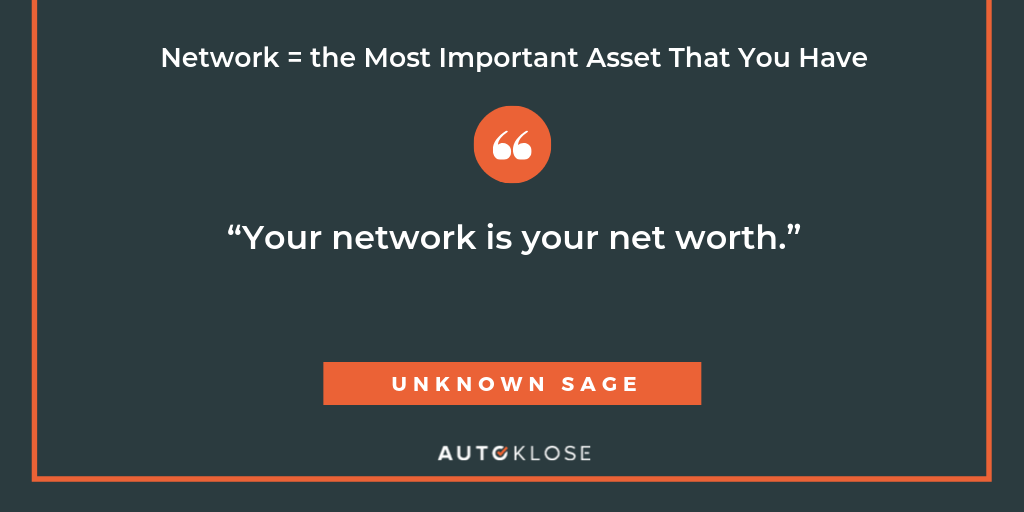
Network = the Most Important Asset That You Have
“Your network is your net worth.”
— Unknown sage
When Shawn Finder and his team were about to launch Autoklose, Shawn alone already had over 30,000 followers on LinkedIn, and over 25,000 followers on Twitter, not to mention hundreds of happy businesses from his previous ventures under his belt. You could almost argue that it was “easy” for him to launch a new product successfully.
Fair, but how he managed to amass that relatively strong following is worth exploring further.
More importantly, it is not only the quantity but the quality of the relationships he built and patiently nurtured.
As a young professional tennis player, Shawn used to coach and teach wealthy, business seniors.
Even early on, Shawn was quick to spot patterns. One thing that he learned from his more experienced, business savvy and overly successful friends was that your network defines your net worth.
One student at his tennis course taught him about an Oxford University psychologist, Robin Dunbar. Dunbar hypothesized that there is a cognitive limit to the number of stable relationships one person can maintain. The number that Dunbar proposed – 150 – has been known as “Dunbar’s Number” ever since.
Many have argued that this number should be increased due to social media and parallel online lives that we lead.
However, professor Dunbar’s 150 has stood the test of time as recent studies have shown that “your brain doesn’t care” about your 1000 Facebook friends.
Dunbar commented: “The fact that people do not seem to use social media to increase the size of their social circles suggests that social media may function mainly to prevent friendships decaying over time in the absence of opportunities for face-to-face contact.”
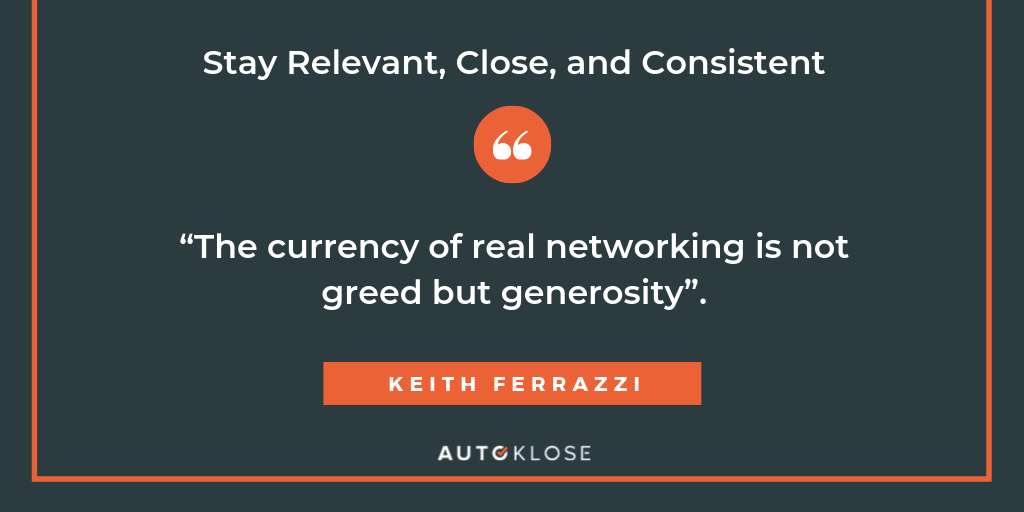
Stay Relevant, Close, and Consistent
“The currency of real networking is not greed but generosity”.
― Keith Ferrazzi.
By now you might be asking yourself how it’s possible for to Shawn manage and engage over 30,000 people in his network if we bear in mind the 150 rule.
And yet, he does. So, where is the catch?
“The catch” is in:
1. Being proactive – effectively reaching out to people, digitally as well as offline, at conferences and local meetups – and taking the stage to speak up and share your thoughts;
2. Staying relevant over time – following trends, taking the time to think about trends and creating them, making sure that what you share is utterly valuable;
3. Staying close to where your stakeholders, as well as the ones whose problem you are trying to solve, are;
4. Unlocking new networks – trying not to exist only in your little bubble, but exploring different ideas and terrains;
5. Being consistent in giving – always first aim to give or earn permission to share, ask, or pitch;
6. Keeping in mind that you play the long game.
As a sales professional in the year 2019 your goal should be to build a trustworthy, personal brand, that helps you to stay in touch with thousands of people and engage in meaningful conversations.
Sometimes it’s just a buzz showing that you exist but sometimes it’s a deep conversation on a topic of mutual interest. This is immensely important because by engaging and interacting with others you build touchpoints.
Every touchpoint between you and your audience builds or betrays trust. Or, so to speak, contributes to that imaginary relationship bank account.
Ultimately your brand and trust will help you to be less of a stranger in your network and more of a trustworthy business partner. You’ll become someone everyone wants to do business with.
By actively engaging with your audience your name will ring a bell – and if you’re communicating with integrity, honesty, bravery, and care – a positive one.
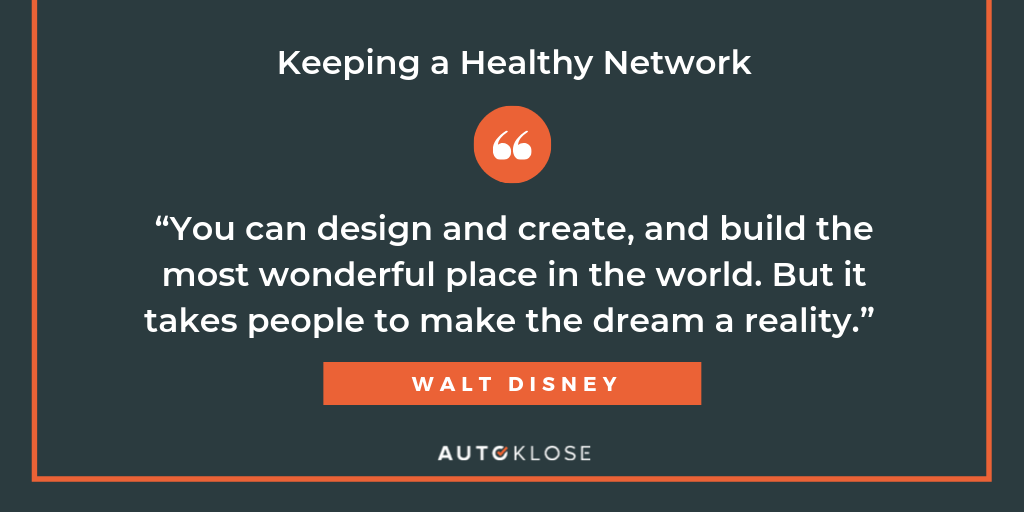
Keeping a Healthy Network
“You can design and create, and build the most wonderful place in the world. But it takes people to make the dream a reality.” — Walt Disney
Many of you reading this might pose a question “How much will it take me to build 30k followers on LinkedIn (or other mediums) as Shawn has?”
Well, ask yourself this:
– How valuable am I to my network, industry or profession?
We deeply believe that you can learn something from every person out there if you are curious and present enough.
Following that logic, you are valuable just as you are.
And of course, you should strive to learn more and, in fact, to never stop learning. So, you should be open-minded to acquire new knowledge, but it’s also important to share what you believe, know, and find valuable.
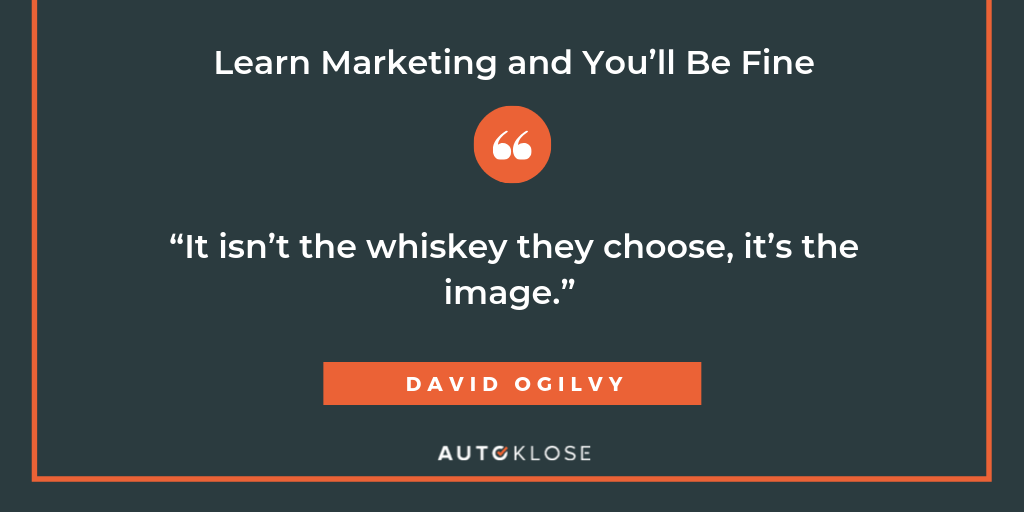
Learn Marketing and You’ll Be Fine
“It isn’t the whiskey they choose, it’s the image.” — David Ogilvy
You might be asking yourself:
“What’s up with these 20 something sales kids online and at live events sharing and boosting posts, acting vulnerable, and telling stories? Like that’s going to build their pipeline. Specialize and you will make progress. Otherwise, you will lose your edge, and go soft.”
While we agree that specialization is important, it’s worth noting there’s an emerging trend that the fastest-growing companies are looking to hire full-stack sales talent, that is, professionals who understand and cover the sales process almost fully.
The reasons for this are:
A. Named organizations invest up to 30% of their revenue into Sales and Marketing while the rest goes into product and customer experience;
B. They value that customer doesn’t want to communicate to X number of people (of course, that is still the case with very complex sales cycles);
C. At these companies, reps have to understand the product entirely so they can be more versatile throughout the buyer’s journey.
D. They’re mostly specialized in particular industries, which makes them capable of deeply understanding buyer personas (industry, roles, their pain points, etc.) and cater towards it.
YES.
Sales is getting more complex. The buyer is more in control than ever.
But it doesn’t have to be painful. We just have to learn to unlearn the old ways and acquire new skills.
In addition, new sales platforms and tools are helping sales generalists to have a comeback no one would ever think would happen.

We talked a lot about your personal brand. But there are a few other tricks that you can borrow from marketing and increase your success:
1) Darn it! Write your own copy – learn copywriting skills. While it is common for marketing departments to write copy for their sales buddies it should not be that way. YOU, your voice, and your brand should be in that email. You are the messenger. And the messenger is the message in a way in 2019.
We all know too much about our products. But buyers are already well informed too. They don’t need a feature/benefit analysis. What they need is your understanding of their day and your ability to paint a portrait depicting a difference between their current pain and how things can be different with your help – they need your ability to tell them a story in which they’re the protagonist.
Only those able to tell engaging, customer-centric stories about themselves and their products will be able to make progress.
Nobody cares when you keep on talking about yourself and your organization. There’s nothing in it for them.
The average attention span has reached a new low – it’s only 8 seconds. If you are unable to write a proper, catchy subject line and a compelling story, you won’t be in the game.
On the other hand, if you master the game of writing a compelling, engaging story will fill your pipeline and be able to 3x cash in on that new skill.
2) You are not alone in this. Go join a group, expand your network, and start and forging relationships with your fellow salespeople. It’s never been easier.
FYI: In the last chapter we cover some of the most important groups that you can join.
To start contributing more to different online communities you have to understand how they work first.
Digital communities are just like their real-life counterparts (no kiddin’). You walk into a bar, and you don’t want to be that weirdo asking questions or pitching. You ideally first observe and then slowly start engaging in conversations, uncovering more and more about other people’s interests and concerns; make sure to engage in sharing your opinion, giving advice, and offering your expertise, until you show up enough to you become a part of the group and attract other people’s attention so that they become interested in hearing your story.
So build your network, nurture it and if you are valuable enough (and you are by default) they will come to you. First for advice and later to make a purchase.
It might be a good time to go back to the branding stories we discussed and re-read some of the principles we’ve shared there such as:
- Be proactive but don’t pitch;
- Stay relevant;
- Stay close and be there to help;
- Unlock new networks – stay open-minded;
- Be consistent in giving – look for the best ways to help first;
- It’s a long game. Stay patient and persistent.
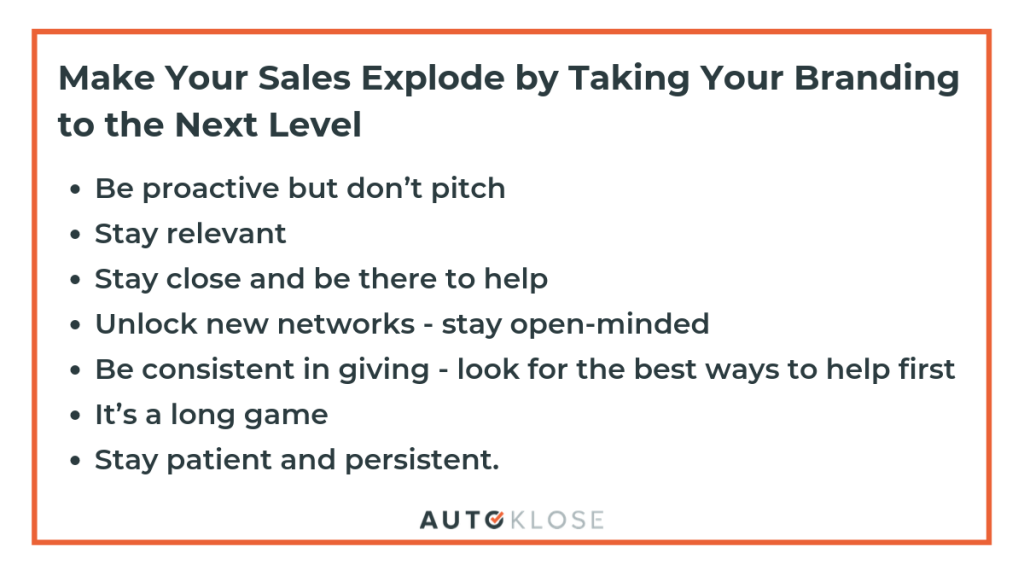
You want to be and also stay perceived as an expert/consultant, someone who can help and be of service.
This will build your pipeline better than any other marketing tactic. And you will stay in charge of the full process.
3) Be proactive and invest in technology. Technology isn’t scary; software isn’t scary. It’s built so that an ordinary person can use it (well, in most cases, even people who aren’t tech-savvy can figure out how to make the most of it.)
This is one of those situations where you have to take a step back in order to start moving forward two steps at the time.
There are so many affordable automation tools and platforms out there that you can purchase or even use for free, and with their help generate massive growth. You can literally become a sales rockstar. That’s the proactiveness everyone wants to see.
If you can cover more functions and increase your output, you are not only improving your company but your own position in it.
So brand, writing, networking, and tech will 3x the game.




[…] order to sell more, you have to make your brand stand out from the competition. You need to make a name for yourself, as that’s how people will pick your product over a more […]